9 Best Education Affiliate Programs in 2023

Are you a course creator looking to increase your online course sales and reach a wider audience through education affiliate programs?
Do you want to tap into new markets and grow your business while helping others achieve their goals?
If so, you’re in the right place! As an expert in your field, you understand the potential your course has to change people’s lives, but with so many online courses available, it can be challenging to stand out from the crowd.
These programs allow you to partner with affiliates who can help promote and sell your course to their audience.
By doing so, you can reach a wider audience, expand your business, and increase your course sales.
Not only that, but you’ll also have the satisfaction of helping others succeed in their personal and professional lives.
So, are you ready to make your course accessible to students from all over the world?
Let’s dive into the 9 best education affiliate programs in 2023 that can help you achieve your goals.
How Education Affiliate Programs Work
How do education affiliate programs work, you ask? They operate by enabling businesses in the education industry to partner with affiliates who market their courses or services. When prospects click on the affiliate’s unique link and buy a course, the affiliate earns a commission for the sale. Unlike other affiliate programs, education ones possess some industry-specific nuances.
Take Coursera, for example, one of the leading education platforms. They welcomed over 21 million new learners in 2022 alone, showcasing the vast potential for course creators to broaden their audiences through education affiliate programs. In the same year, Coursera generated a total income of $523.8 million, a 26% year-on-year increase from $415.3 million, exhibiting the growth opportunities for online education and course creators to pocket significant commissions through affiliate partnerships.
Without a doubt, education affiliate programs represent a win-win situation for companies and affiliates. Companies can penetrate new industries and enlarge their markets, while affiliates earn commissions and help learners achieve their goals.
The Process of Education Affiliate Programs
Here’s a step-by-step guide on how education affiliate programs work:
Course Creators Join an Affiliate Program: Course creators find an affiliate program and apply to join it. The affiliate program may have certain requirements that the course creator must meet before being accepted.
Affiliates Promote the Course Creator’s Services: Once accepted into the affiliate program, affiliates receive a unique affiliate link that they can promote and share with their audience. The link directs the audience to the course creator’s website or service.
Affiliate Earns Commission: Affiliates earn a commission for each sale made through their link. Some affiliate programs offer a flat fee per sale, while others offer a percentage of the sale.
Advantages of Education Affiliate Programs
Here are some advantages of education affiliate programs:
Increased Exposure: Education affiliate programs allow course creators to tap into new markets and reach a wider audience. Affiliates may have different audiences and can promote the course creator’s services to people that the course creator would not have otherwise reached.
Good for SEO: Since affiliates link back to the course creator’s website, this can help improve the course creator’s search engine ranking. More backlinks to a site increase site authority and improve search rankings.
Increased Revenue: Education affiliate programs can be a valuable source of passive income for both the course creators and the affiliates. Course creators can earn more revenue from sales made through the affiliate’s links, while affiliates can earn a commission for simply promoting the course creator’s services.
Explanation of the Target Audience
The target audience for education affiliate programs includes:
Course Creators: Education affiliate programs are perfect for course creators who are looking to increase their revenue and reach a wider audience.
Affiliates: Bloggers, YouTubers, content creators, and social media influencers who have an audience in the education or training niche can benefit from education affiliate programs.
Education affiliate programs are a win-win for both course creators and affiliates. Course creators can increase their exposure and revenue, while affiliates can earn a commission by promoting the course creator’s services to their audience. With the increasing popularity of online learning, education affiliate programs are becoming more lucrative and offer great opportunities for businesses and affiliates.
Benefits of Education Affiliate Programs for Course Creators
Education affiliate programs present course creators with numerous benefits that can be leveraged to increase revenue, attract a wider audience, and build valuable relationships with affiliates. In this section, we will delve into the top benefits that course creators can expect by participating in education affiliate programs.
Increase in Revenue and Audience Reach
One of the most obvious benefits of education affiliate programs for course creators is an increase in revenue and audience reach. By partnering with affiliates who have an audience that aligns with the course creator’s niche, course creators can reach out to a wider audience that they would not have reached otherwise. Furthermore, affiliates who directly promote their products or services, increasing the likelihood of conversions leading to more revenue.
Building a Relationship with Affiliates
Course creators can greatly benefit from the relationships built with affiliates through education affiliate programs. Given that the affiliate’s primary objective is to promote the course creator’s products or services, a relationship built through clear communication can become a long-term symbiotic business partnership. By providing affiliates with the resources they need to successfully promote products or services, they can be encouraged to spend more time endorsing the creator’s products or services leading to more revenue and reach.
Qualities to Look for in Education Affiliate Programs
Choosing the right education affiliate program can directly impact course creators’ earnings, increase audience reach, and build a long-term collaborative strategy with affiliates. Therefore, it’s essential to understand the characteristics that make an education affiliate program valuable.
Commission Rates
Commission rates are the percentage of revenue a course creator pays an affiliate for referring a sale through their unique link. When evaluating an education affiliate program, course creators must consider the commission rate offered. It’s recommended to look for programs that offer a higher commission rate, ultimately leading to higher revenue.
Cookie Durations
Cookie duration refers to the length of time an affiliate’s cookie remains active on a customer’s device. Suppose an interested customer clicks on the affiliate’s unique link but doesn’t complete the sale process straight away. In that case, the cookie duration is essential to determine if the purchase counts as a referral. Course creators can consider programs with longer cookie durations and ensure that customers have enough time to make a purchase.
Program Requirements
Each education affiliate program has unique requirements that creators must meet before and after joining the program. Some programs may require course creators to have a minimum amount of monthly website traffic or a specific audience size. Additionally, course creators must evaluate the program’s requirements, such as its promotional guidelines, campaign requirements, and any brand restrictions.
Reputation
Checking the reputation of an education affiliate program provider is crucial. A provider’s reputation should be reviewed through testimonials, reviews, ratings or recommendations, and the program’s social media pages. Course creators should choose affiliate programs that are reliable and provide dedicated support and guidance to their affiliates.
Transparency
Finally, transparency in payment and commission structures is essential when choosing an education affiliate program. Course creators need to ensure that there’s a reference point for income earned through referrals, alongside transparent payment mechanisms.
The traits of the education affiliate programs mentioned above enable course creators to evaluate different opportunities’ strengths and weaknesses. These qualities include choosing a reputable, transparent platform with high commission rates, longer-lasting cookies and established program requirements, setting them on course for long-term success.
9 Best Programs for educational affiliates
- Udemy
- Coursera
- Teachable
- edX
- Pluralsight
- Treehouse
- Rosettta Stone
- Udacity
- Thinkific
Udemy
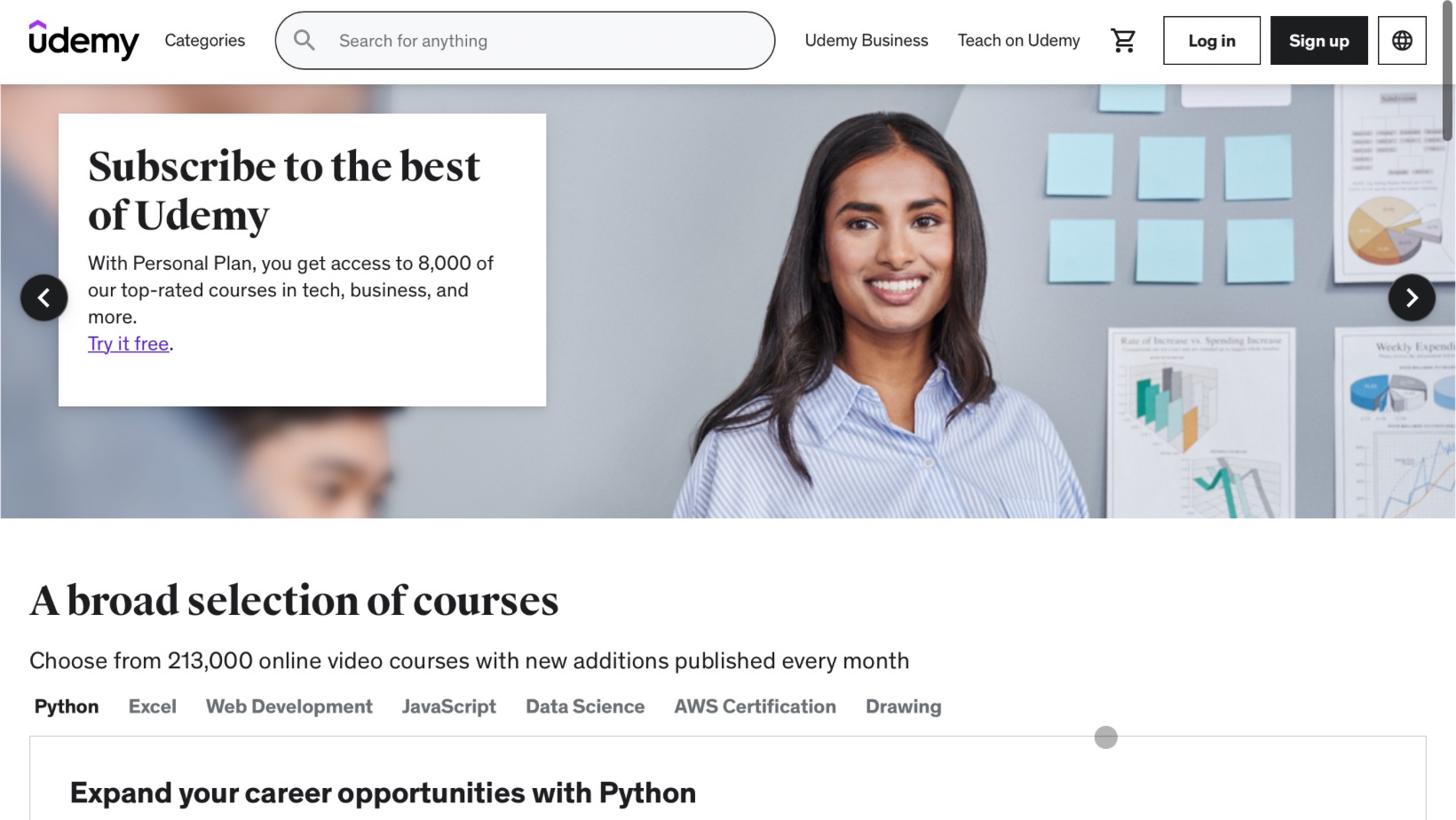
Overview:
Udemy is a leading online learning platform that offers courses on various topics, spanning from business and technology to personal development and creative arts. With over 213,000 courses and more than 74,000 instructors on the platform in 2022, students can learn at their own pace and from anywhere in the world. In a 2020 report, Udemy was valued at $3.25 billion, demonstrating its importance in the online education industry.
Additionally, Udemy allows individuals to create and sell their own courses on this accessible platform, granting them the flexibility to structure and deliver their content to meet the needs of the audience they seek to reach. With Udemy courses enrollment rising to 773 million in 2022, it’s evident that this platform provides a vast market for course creators to reach a wider audience. Moreover, Udemy reported revenue of $599.22 million in 2022, showing the potential for course creators to earn significant commissions through Udemy’s revenue-sharing model.
Commission and Cookie:
- Instructors receive 97% of the revenue from sales made through their coupons or referral links.
- Instructors receive 37% of the revenue for sales made without their promotion.
- Instructors can track their sales through the Revenue Report.
- 7-day cookie.
- affiliates receive 10% commission.
Pros & Cons:
Pros:
- Udemy offers a large platform to promote your course to a global audience.
- As an instructor, you have complete control over the content and structure of your course.
- Udemy has a robust reporting system that helps you understand market demand and provides useful data to shape your course material.
- There are no fees to pay in order to become an instructor on Udemy.
- Instructors are paid according to a revenue share model and paid on a monthly basis.
- You can promote your course on other services as well and retain all rights to your content.
Cons:
- The quality of courses can vary greatly since anyone can create and sell courses, which could lead to negative reviews and a decrease in sales for your course.
- Udemy charges a commission on course sales, which can be up to 50% of the sale.
- There is a lot of competition on the platform, which can make it challenging to stand out and gain traction for your course.
- Udemy has specific course requirements, such as a minimum of 30 minutes of video content, which may not align with your course material or teaching method.
Is it worth it?
Promoting your course through Udemy can prove to be a valuable proposition. After all, Udemy boasts of a vast platform with millions of students from all over the globe, which means that your course has the potential to reach an overwhelming audience.
As an instructor, you have complete control over the content and structure of your course, which makes you flexible enough to teach everything that you love or know. Udemy also offers an array of helpful tools, such as the Marketplace Insights that enable you to gauge demand for your course topic.
To sweeten the deal, there are no upfront costs to becoming an instructor, and you get paid based on the revenue-sharing model. What’s even better is that you get to keep all rights to your content, thereby allowing you to utilize it on other platforms as well. Admittedly, there are potential downsides to using Udemy to promote your course, as highlighted in the cons list; hence, you need to be aware of these factors before making any decisions.
Nevertheless, if you have an excellent course to offer and are willing to invest time and effort into marketing through Udemy, it can prove to be a worthwhile platform to help you promote your course.
Example:
With Udemy courses enrollment rising to 773 million in 2022, it’s no surprise that marketing professionals are turning to the platform to sell their courses. Take the example of a marketing professional with years of experience in digital marketing.
They recognize that there’s a high demand for social media marketing knowledge among small business owners. With Udemy, they can create an online course on social media marketing and reach a wider audience.
By leveraging the platform’s user base, they can share their expertise with thousands, if not millions, of learners around the world. Plus, with Udemy’s promotional tools and affiliate program, they can boost their course’s visibility and attract even more learners. It’s a win-win situation for both the course creator and the learners!
Coursera
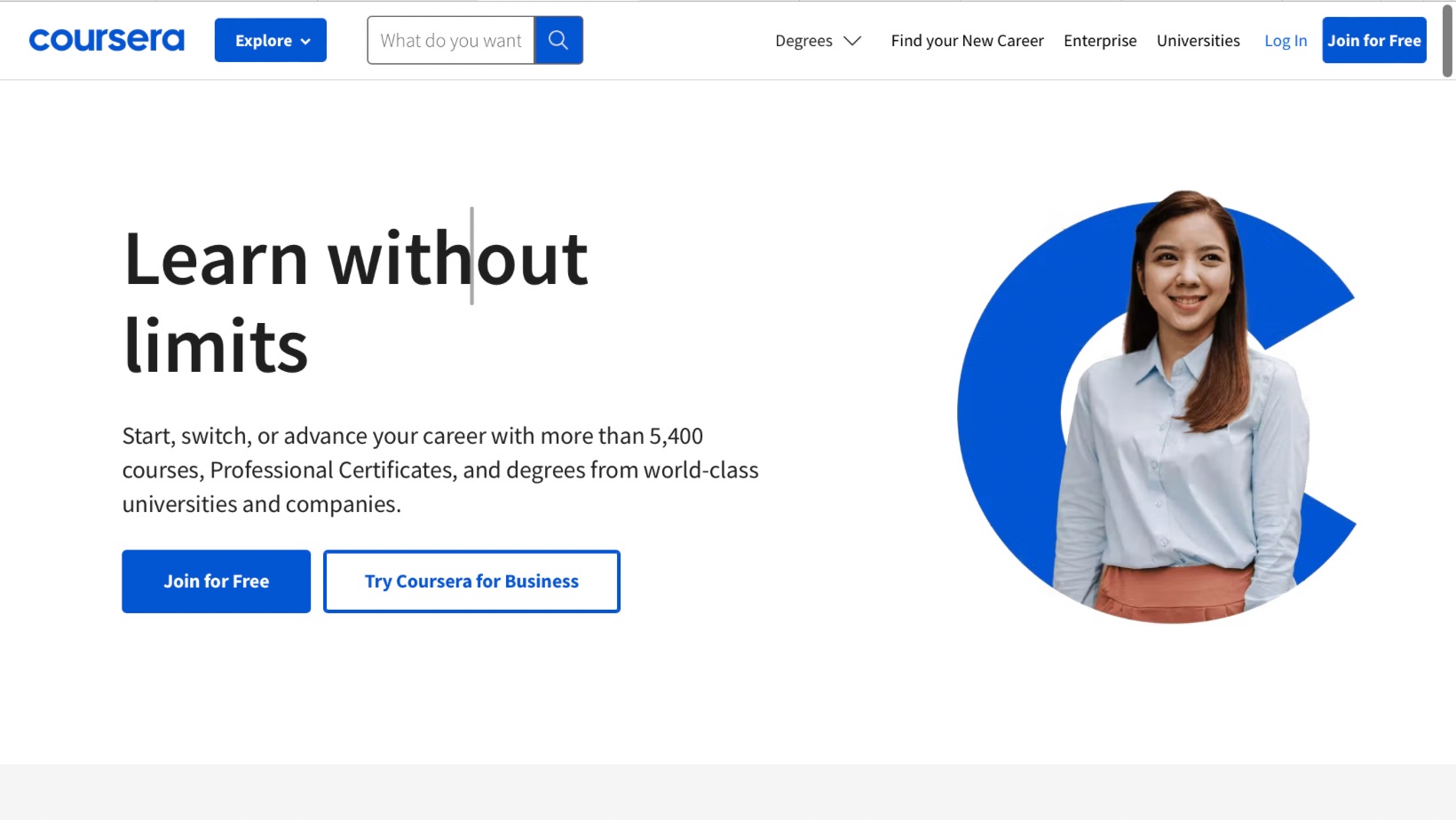
Overview:
Coursera is a well-known online education provider that offers a wide range of courses, certificates, and degrees from top universities and institutions around the world. It was founded in 2012 by two computer science professors, Andrew Ng and Daphne Koller, with the aim of making quality education more accessible to learners worldwide.
Since its inception, Coursera has grown to become one of the largest MOOC (Massive Open Online Course) platforms with over 77 million learners and over 4,000 courses in various subjects including business, technology, data science, arts, humanities, health, and social sciences. Coursera also partners with leading universities, including Stanford, Duke, and Yale, to offer online degrees in various fields.
Through its platform, Coursera provides high-quality online learning opportunities to learners of all backgrounds, whether they are professionals looking to upskill, students seeking academic credit, or individuals seeking to learn new skills for personal enrichment.
Commission and Cookie:
- Coursera offers a commission of 20% for every sale made through an affiliate link
- Its cookie duration is 30 days, giving affiliates enough time to earn a commission from the referrals they generate.
Pros and Cons:
Pros:
- Offers access to courses from top universities and organizations around the world
- Offers flexible learning options, such as self-paced courses and specializations
- Offers a wide range of courses on various subjects
- Provides verified certificates upon course completion.
Cons:
- Some courses can be expensive
- Not all courses offer verified certificates.
Is it worth it?
Overall, Coursera is a great platform for people who want to learn new skills and gain knowledge from some of the world’s best universities and institutions. With its affordable subscription fees and diverse range of courses, Coursera is definitely worth trying out.
Example: John wanted to learn data science but couldn’t afford a traditional degree program. He signed up for Coursera’s data science specialization and was impressed with the quality of the courses. He learned everything he needed to know about data science and landed a job at a tech company.
Teachable
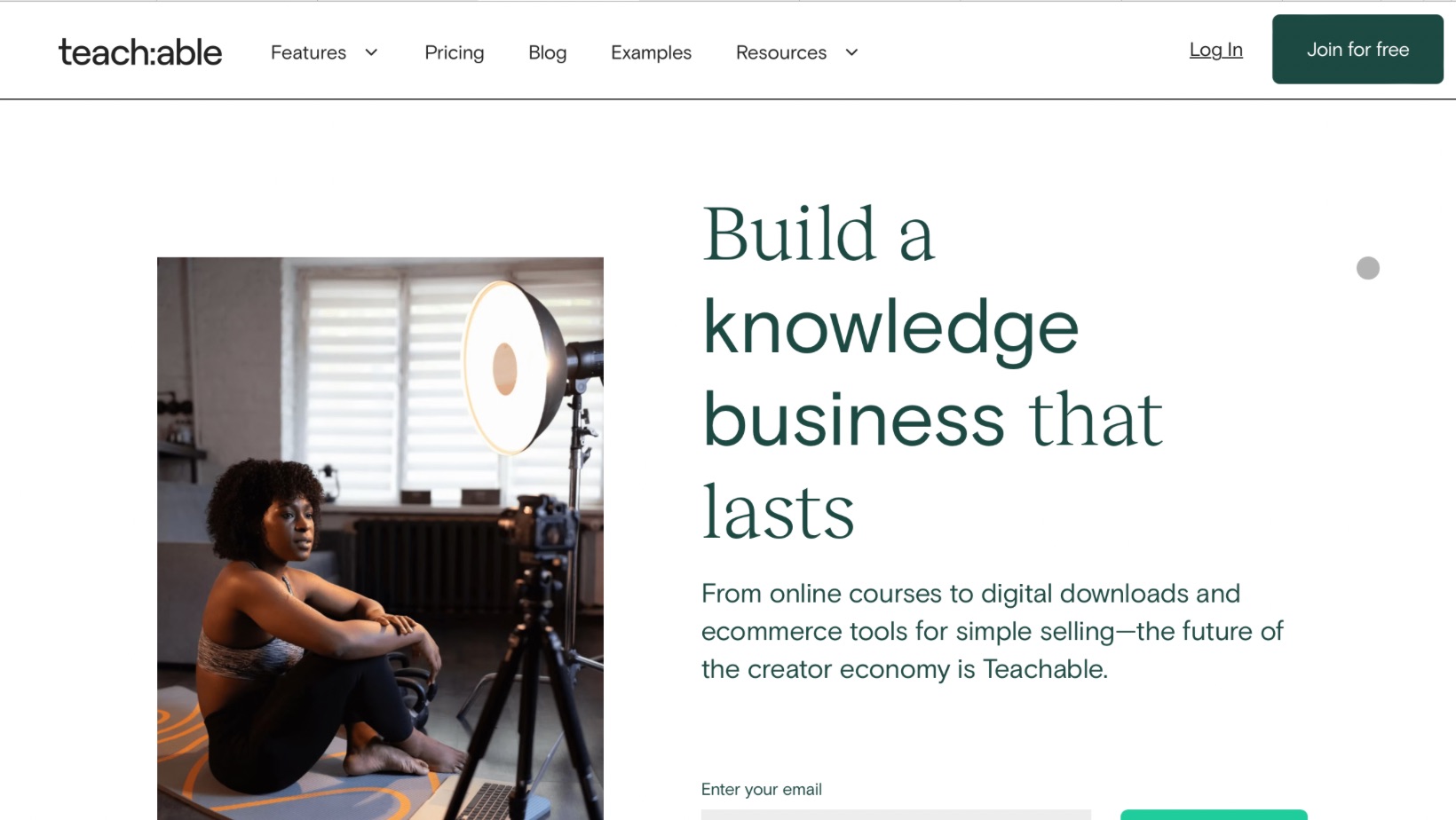
Overview:
With over 100,000 creators using Teachable, this all-in-one platform allows you to easily build and manage your online courses, digital downloads, and coaching products without any coding or design skills. Whether you’re an influencer with a large following on social media or a teacher looking to bring your in-person classes online, Teachable has the tools to help you monetize your knowledge and build a thriving knowledge business.
The platform’s intuitive course builder, customizable sales page builder, and robust suite of monetization tools—including upsells, bundles, and order bumps—makes it easy to create and sell your products. Plus, with Teachable:Pay, you’ll have access to automated tax filings, fraud monitoring, chargeback support, and ecommerce optimization tools to give you peace of mind when it comes to managing your business.
Teachable also offers a free plan to get you started, with the option to upgrade later for additional resources as your business grows.
Commission and Cookie:
- affiliates receive 30% commission
- 90-day cookie
Pros and Cons:
Pros:
- Easy to set up and use, even for those with no technical knowledge.
- Allows for customization of your course website.
- Offers various payment options, including Stripe and PayPal.
- Provides features for course analytics and reporting.
- Offers secure hosting and integration with third-party tools like MailChimp and Zapier.
Cons:
- The basic plan comes with limited features.
- The transaction fees charged by Teachable on every sale made can be high.
- Limited design customization options.
- Limited options for course certificates.
Is it worth it?
In my opinion, Teachable is worth it, especially for those who are new to the online course creation space. It offers an easy-to-use interface with plenty of customization and course management tools. The platform is also secure and reliable, and the commission rate for affiliates is competitive. However, the transaction fees can be a concern for some users.
Example: One of the best examples of successful course creators on Teachable is Jess Lively, who has built her business around online courses. She has been able to create and market her courses with ease using Teachable, which has helped her make more than $5 million in course sales. Her courses are highly sought after, and she has been able to create a passive income stream using Teachable.
edX

Overview:
edX is an online learning platform that partners with top universities and organizations to offer courses on a variety of subjects. The platform offers both free and paid courses, and students can earn certificates and degrees upon completion.
Commission and Cookie:
edX offers a commission rate of 5% on course sales, with a 30-day cookie duration.
Pros and Cons:
Pros: edX offers courses from top institutions, giving affiliates a reputable and high-quality product to promote. The platform also offers a 30-day cookie duration, which gives affiliates more time to earn commissions on course sales.
Cons: The commission rate for edX is quite low compared to other education affiliate programs, which could be a deterrent for some affiliates. The platform also has strict guidelines for affiliates, which could limit the types of promotions they can use.
Is it worth it?
While edX offers high-quality courses from top institutions, the low commission rate may make it less attractive for affiliates. Affiliates should weigh the reputation of the platform against the potential earnings before deciding to promote edX.
Example: As an affiliate marketer in the science and technology niche, you could promote a course on edX that teaches users about artificial intelligence. The course is highly rated and offers a certificate upon completion, and you earn a 5% commission on each sale made through your affiliate link.
Pluralsight
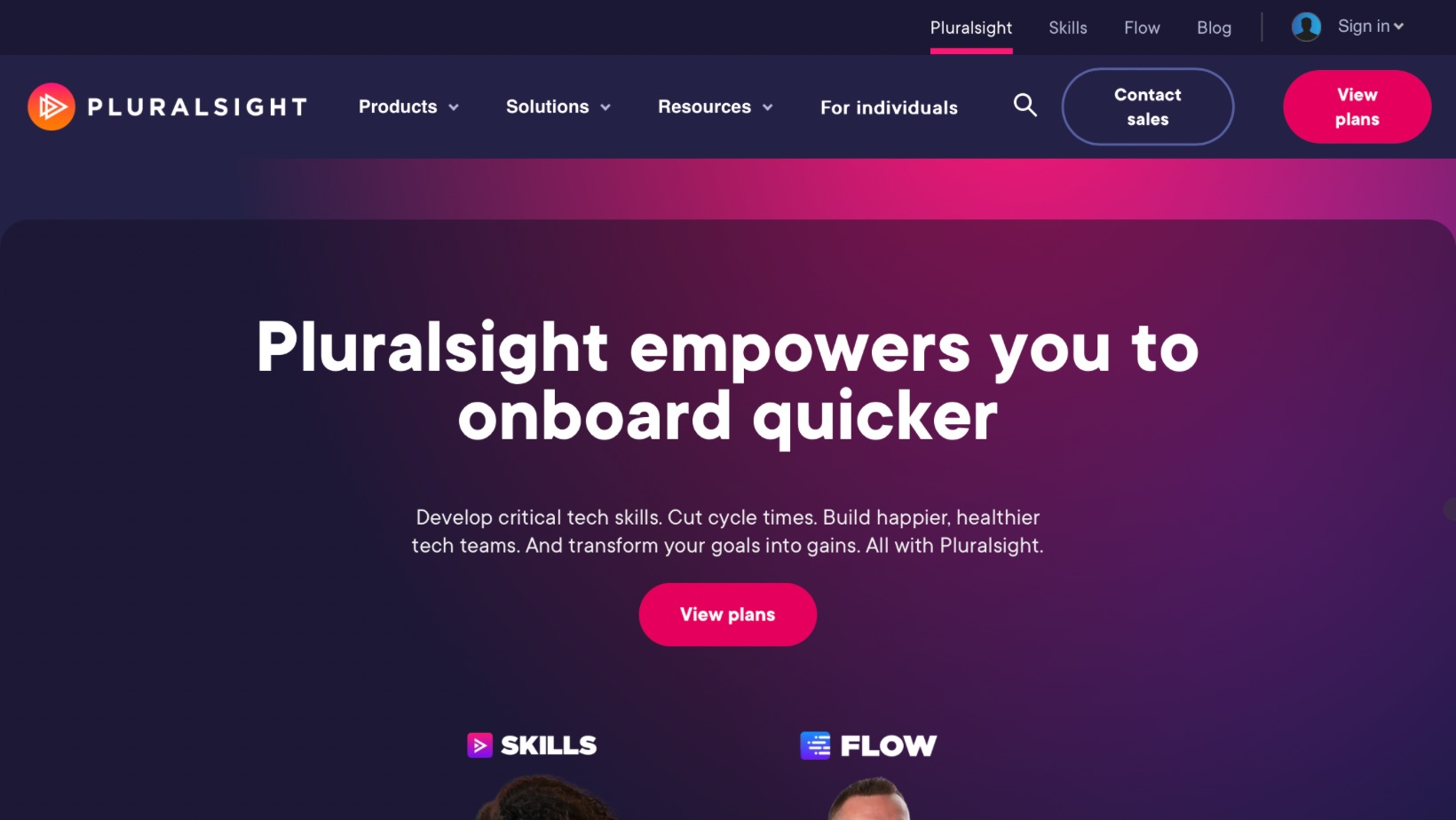
Overview:
Pluralsight is an online learning platform that offers courses on technology, creative, and business topics. The platform is aimed at professionals looking to improve their skills, and offers both individual and enterprise plans.
Commission and Cookie:
Pluralsight offers a commission rate of 15% on annual subscriptions, with a 45-day cookie duration.
Pros and cons:
Pros: Pluralsight offers courses on high-demand topics, making it an attractive option for affiliates in the technology and business niches. The 15% commission rate is also competitive, and the 45-day cookie duration gives affiliates more time to earn commissions on annual subscriptions.
Cons: Pluralsight’s courses can be quite expensive, which may deter some potential customers. The platform also has strict guidelines for affiliates, which could limit the types of promotions they can use.
Is it worth it?
Pluralsight can be a good affiliate program for those in the technology and business niches who are looking to promote high-quality courses. The 15% commission rate and 45-day cookie duration are also attractive for affiliates.
Example: As an affiliate marketer in the technology niche, you could promote a Pluralsight course on cybersecurity. The course is highly rated and offers a certificate upon completion, and you earn a 15% commission on each annual subscription made through your affiliate link.
Treehouse
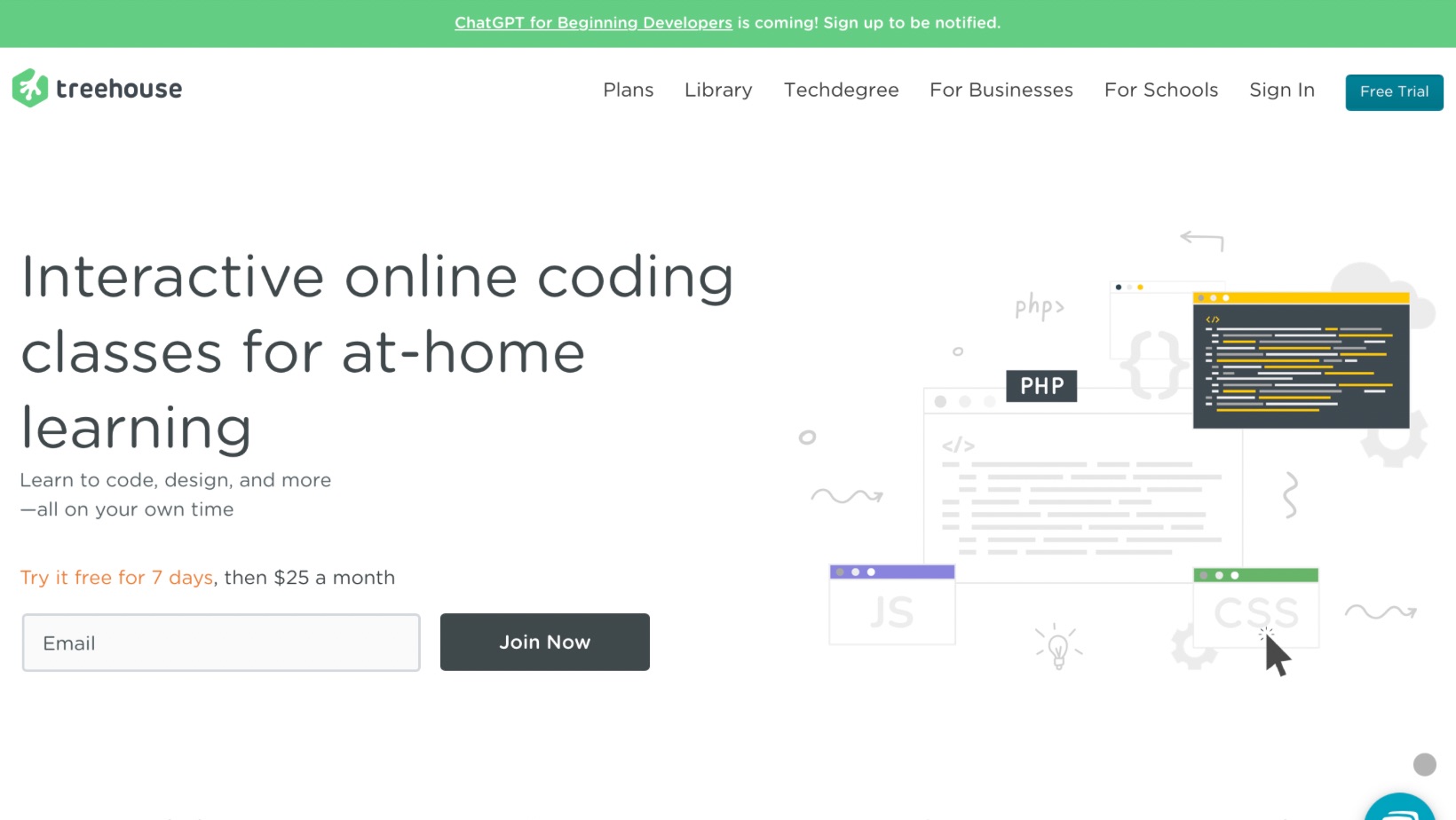
Overview:
Treehouse is an online learning platform that offers courses on technology and business topics. The platform is aimed at beginners and offers a variety of tools to help users learn at their own pace.
Commission and Cookie:
Treehouse offers a commission rate of 50% on the first month of a new user’s subscription, with a 10-day cookie duration.
Pros and Cons:
Pros: The 50% commission rate for the first month is very attractive for affiliates, and the platform’s focus on beginners can also make it a good option for those in the technology and business niches.
Cons: The 10-day cookie duration is quite short compared to other education affiliate programs, which could limit the amount of time affiliates have to earn commissions.
Is it worth it?
Treehouse can be a good option for affiliates who are looking for a platform that focuses on beginners and offers a high commission rate for the first month. However, the short cookie duration could make it more difficult to earn commissions over time.
Example: As an affiliate marketer in the technology niche, you could promote a Treehouse course on web development for beginners. The course is highly rated and offers a variety of tools to help users learn, and you earn a 50% commission on the user’s first month subscription made through your affiliate link.
Rosetta Stone
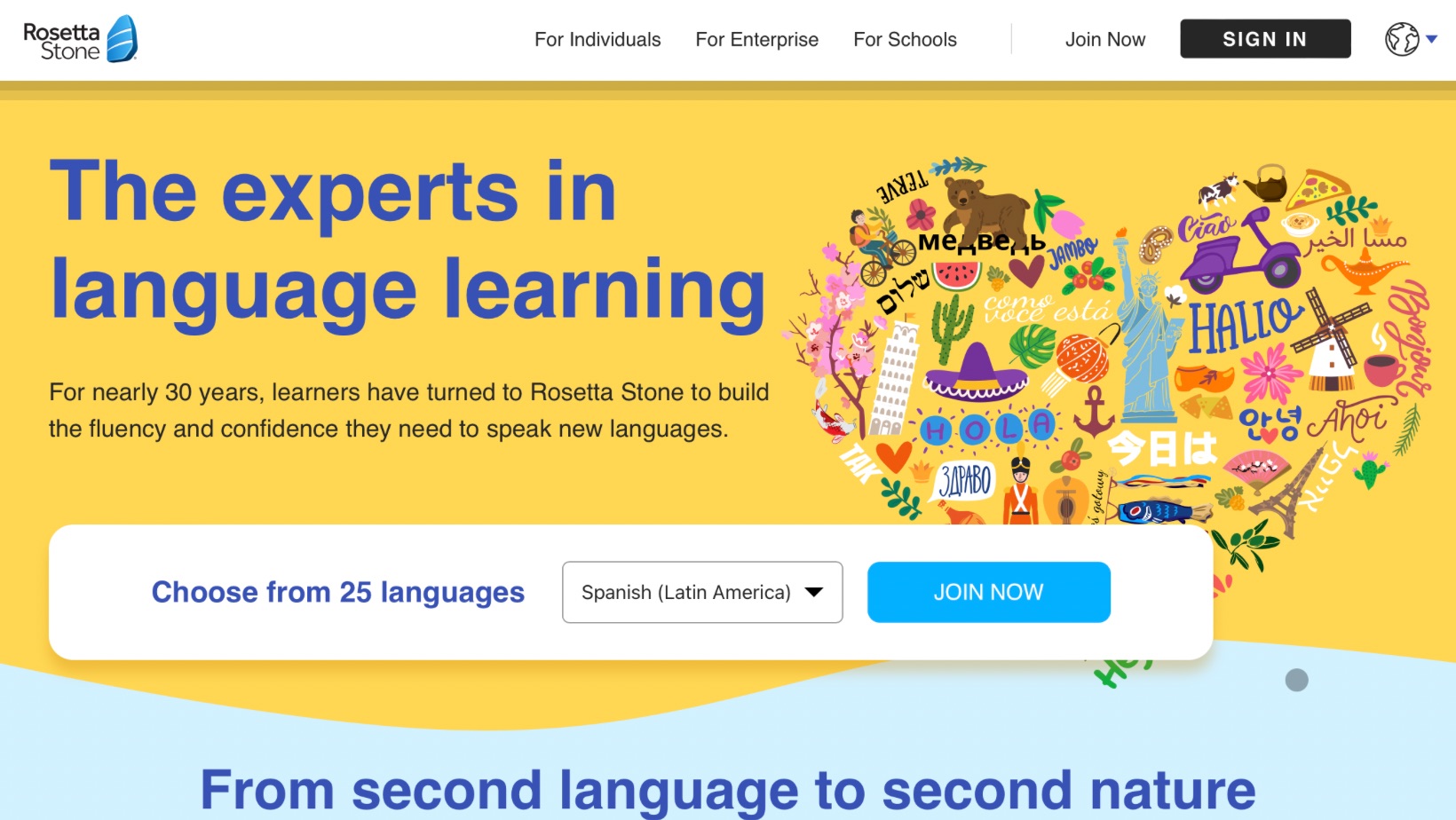
Overview:
Rosetta Stone is a well-known language learning platform that offers courses in over 25 languages. The Rosetta Stone affiliate program is designed to help online marketers earn money by promoting Rosetta Stone’s language learning software and courses. As an affiliate, you’ll have access to a range of marketing materials and tools to help you promote Rosetta Stone and earn commissions on any resulting sales.
Commission and Cookie:
The Rosetta Stone affiliate program offers a commission rate of 10% on all sales made through your affiliate link. The program uses a 30-day cookie, which means that if someone clicks on your affiliate link and makes a purchase within 30 days, you’ll receive a commission on the sale.
Pro and Cons:
Pros:
- Wide range of marketing materials and tools to help you promote Rosetta Stone
- High commission rate of 10%
- 30-day cookie duration provides ample time for customers to make a purchase
- Rosetta Stone is a well-known and respected brand in the language learning industry
Cons:
- The commission rate may not be as high as some other language learning affiliate programs
- Some customers may prefer free language learning apps or platforms over paid courses
Is it worth it?
If you have an audience that is interested in language learning or education, the Rosetta Stone affiliate program can be a great way to monetize your website or social media following.
With a high commission rate and a range of marketing materials to choose from, you can promote Rosetta Stone in a way that resonates with your audience and helps them achieve their language learning goals.
Additionally, Rosetta Stone’s reputation as a top language learning platform can help to increase trust and credibility with your audience. Overall, the Rosetta Stone affiliate program is a great option for language learning enthusiasts and educators alike.
Udacity
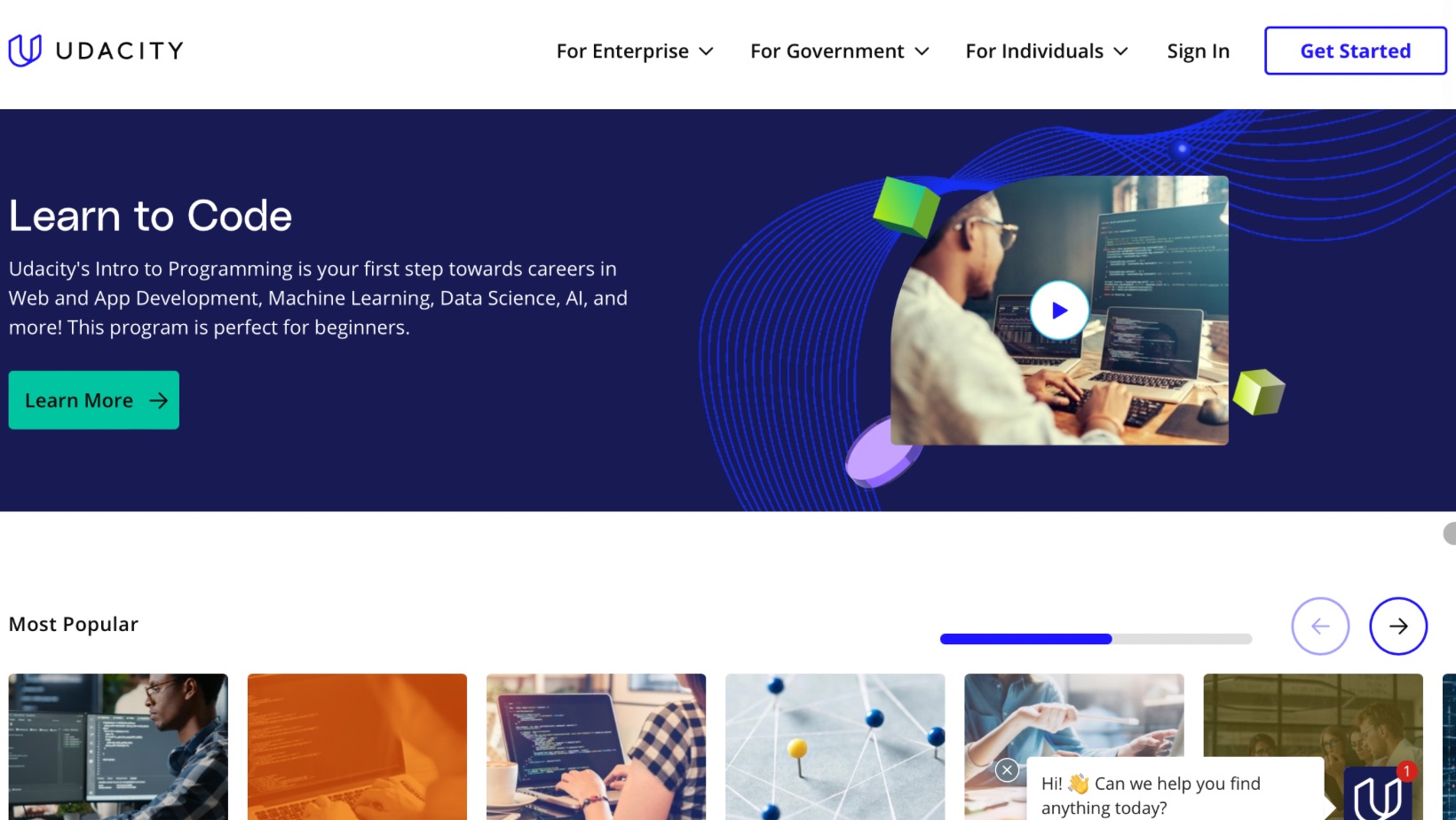
Overview:
Udacity is an online learning platform that offers courses on technology and business topics. The platform is aimed at professionals looking to improve their skills, and offers both individual and enterprise plans.
Commission and Cookie: Udacity offers a commission rate of 15% on course sales, with a 30-day cookie duration.
Pros and Cons:
Pros: Udacity offers courses on high-demand topics, making it an attractive option for affiliates in the technology and business niches. The 15% commission rate is also competitive, and the 30-day cookie duration gives affiliates more time to earn commissions on course sales.
Cons: Udacity’s courses can be quite expensive, which may deter some potential customers. The platform also has strict guidelines for affiliates, which could limit the types of promotions they can use.
Is it worth it?
Udacity can be a good affiliate program for those in the technology and business niches who are looking to promote high-quality courses. The 15% commission rate and 30-day cookie duration are also attractive for affiliates.
Example: As an affiliate marketer in the technology niche, you could promote a Udacity course on artificial intelligence. The course is highly rated and offers a certificate upon completion, and you earn a 15% commission on each sale made through your affiliate link.
Thinkific
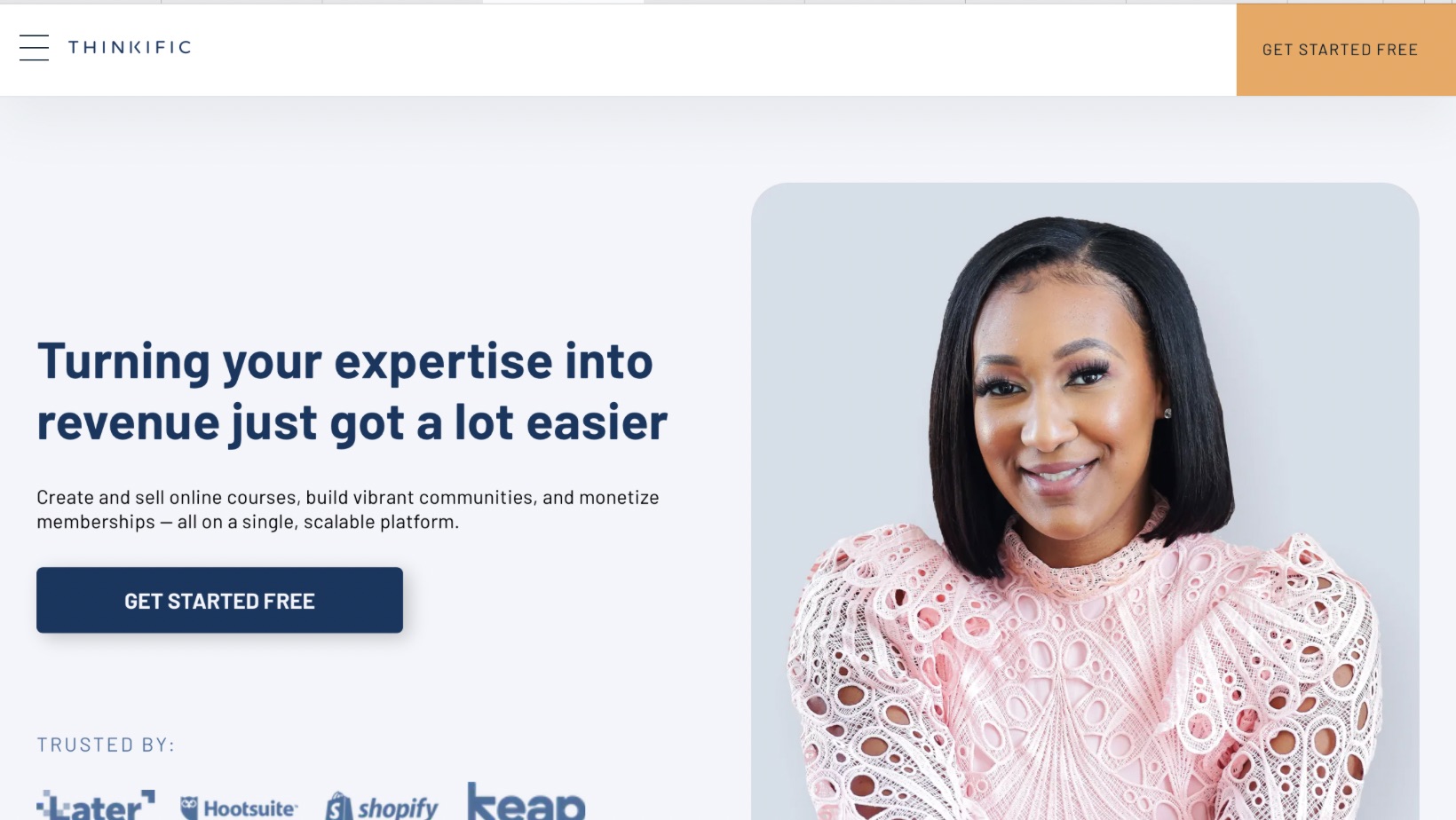
Overview:
Thinkific is an online course platform that allows course creators to create and sell their own courses. The platform offers a variety of tools to help course creators build and market their courses, and also offers a marketplace for users to discover and purchase courses.
Commission and Cookie:
Thinkific offers an affiliate program where affiliates can earn 20% recurring commission for every new Thinkific customer that they refer. The tracking cookie is set to 90 days, which gives affiliates a decent amount of time to earn commissions
Pros and Cons:
Pros:
- Easy to use platform with many customization options.
- Offers various features such as course completion certificates and quizzes.
- Great customer support.
- Offers a free plan with limited features.
Cons:
- Limited payment options.
- Limited marketing features.
- Limited integrations with third-party tools.
- No built-in ability to offer discounts or coupons.
Is it worth it?
Overall, Thinkific is a great platform for creating and selling online courses. It offers a range of features and customization options that can suit the needs of various course creators. Although it has some limitations, the platform’s benefits outweigh the cons. Additionally, the 20% recurring commission offered through the affiliate program is a great incentive for affiliate marketers to promote Thinkific courses.
Example: As an affiliate marketer in the education niche, you could promote a course on Thinkific created by a language teacher. The course offers a unique approach to learning a new language and has a high rating, and you earn a 20% commission on each sale made through your affiliate link.
Are Education Affiliate Programs Worth It?
In conclusion, education affiliate programs offer a great way for course creators to expand their reach and earn passive income.
By partnering with affiliates, they can promote their courses to a wider audience and increase their sales. As we’ve seen, there are several factors to consider when choosing an education affiliate program, such as commission rates and cookie durations.
Out of the nine best programs we’ve listed, each has its pros and cons, so it’s important to choose the one that is the best match for your niche and audience.
Ultimately, education affiliate programs can be a win-win situation for course creators and affiliates alike, helping students around the world to achieve their personal and professional goals.
Frequently Asked Questions
What are education affiliate programs?
Education affiliate programs are partnerships between companies that offer educational products or services and affiliate marketers who promote those products or services in exchange for a commission on any resulting sales.
How do education affiliate programs work?
Affiliates promote educational products or services through various channels such as blog posts, social media, or email marketing. When someone clicks on their affiliate link and makes a purchase, the affiliate earns a commission on the sale.
What commission rates do education affiliate programs offer?
Commission rates vary depending on the program, but typically range from 10% to 50% of the sale price. Some programs also offer performance-based commission structures or tiered commission rates based on the number of sales an affiliate makes.
Are there any restrictions on promoting education affiliate programs?
Each program has its own guidelines and restrictions, but common restrictions include not being allowed to bid on branded keywords or using certain types of promotional tactics. Affiliates should carefully review the guidelines before promoting any program.

